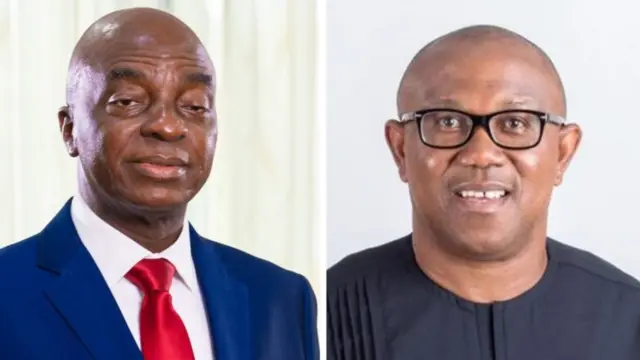Spotlights
‘NO MORE YES DADDY’: Fresh Attack on Peter Obi after Snubbing Bishop Oyedepo On 71st Birthday

Tensions appear to have escalated between the 2023 Labour Party Presidential candidate, Peter Obi, and the influential General Overseer of Winners Chapel, Bishop David Oyedepo.
This schism became evident when Obi declined to extend a congratulatory birthday message to the Bishop, a decision interpreted as a significant slight within certain Christian communities. Click link to continue reading.

The backdrop to this rift is a controversial leaked audio recording in which both Obi and Oyedepo discussed the 2023 elections, characterizing them as akin to a religious battle.
This conversation has further fueled divisions among their respective supporters, heightening the stakes in a politically charged atmosphere. As both figures represent substantial constituencies—one rooted in political ambition and the other in religious leadership—this fallout could have far-reaching implications for their followers and the broader socio-political landscape.
In the viral leaked audio published by People’s Gazette, Peter Obi was heard begging David Oyedepo of the Living Faith Church for support.
Obi asked Mr Oyedepo to help spread the message to his followers in the southwest and northcentral states.
The leaked audio had since generated heated conversations and controversies on social media with many Nigerians condemning Peter Obi for championing religious-driven campaign in a multi-dimensional country like Nigeria.
Read the conversation word for word below:
Peter Obi: Good morning Daddy.
Bishop Oyedepo: Praise the Lord, how are you Sir?
Peter Obi: Fine Daddy, good morning Sir.
Bishop Oyedepo: Amen, in Jesus name we are going to get bright results.
Peter Obi: Thank you Daddy, when I hear these your calls and prayers, Daddy it’s very dear to me. Like I keep saying if this works, you people will never regret the support.
Bishop Oyedepo: Amen! Amen! We look forward to God’s intervention.
Peter Obi: Thank you, Daddy, I need you to speak to your people in South West and Kwara, the Christians in South West and Kwara, this is a religious war.
Bishop Oyedepo: I believe that… I believe that… I believe that… You know I did a release ‘Nigeria Going Forward’ and I am coming with the second one today. I wanted it out when they won’t have any time to do damage control. But in the name of Jesus this would be a success. You know what I said in today’s own? A sickling nation like Nigeria will require a strong and healthy personality. I said anyone whose source of wealth could not be verified should not have access to governance. So all we are doing is appealing to the conscience of people to know where to go. But I want to assure you, in the name of Jesus, that the result will be favourable.
Peter Obi: Thank you Daddy.
Bishop Oyedepo: So relax yourself don’t be apprehensive. Are you in Lagos or Abuja?
Peter Obi: I am in Onitsha now
Bishop Oyedepo: So you will be there for the election?
Notable figures in Nigeria, including President Bola Ahmed Tinubu, have extended their warm congratulations to the esteemed and Africa’s wealthiest pastor, Bishop David Oyedepo, as he celebrates his 71st birthday.
This event has stirred various reactions, particularly from former presidential aide Reno Omokri, who criticized former presidential candidate Peter Obi for failing to acknowledge the influential pastor with a congratulatory message.
Omokri’s remarks, shared on his X account, sparked a wave of mixed responses from users, highlighting the complexities of public sentiment surrounding such high-profile interactions.
He said: “He did not congratulate Prof Wole Soyinka on his birthday.
He ignored the Ooni of Ife on his 50th birthday and only posted about it a week later.
He refused to send birthday greetings to his ‘Daddy’ Bishop David Oyedepo on his birthday, which is today, but found time to celebrate his ‘brother’, the Olubadan of Ibadan.
And he totally sidelined Pastor Poju Oyemade on his birthday.
All of these men have assisted Peter Obi at one point or another.
Does Nigeria need such a petty President? God forbid!”













